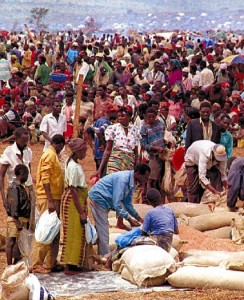Dr. Kishor Wasan is an independent researcher currently working at the University of British Columbia. His research team at the UBC Faculty of Pharmaceutical Sciences is dedicated to developing a treatment for Visceral Leishmaniasis (VL) VL is a parasitic disease spread by infected sand flies that targets the liver, spleen, and bone marrow and can lead to symptoms such as fever, weight loss and fatigue. Once infected with VL, the individual is unable to fight off the disease and will ultimately die if left untreated.
People living in developing nations and third world countries are at high risk for this disease, and an estimated 60,000 deaths occur annually due to VL in these areas. It is common in areas with high population density and climates that frequently experience droughts and famines. Many North Americans are unfamiliar with VL, even though it is a lot more relevant to us than we may realise. India, Brasil, and Africa have become popular sites for tourists which has resulted in an increase in North American exposure to this disease. Therefore, the number of VL cases are rising because people that visit these countries are contracting the parasite.
Unfortunately, there are only a few treatment options available that eliminate the deadly effects of VL. Currently, the most effective treatment being used is an antibiotic called Amphotericin B, or AmB. The version of AmB being used for the initial treatment is Liposomal AmB, and it is composed of AmB along with several other chemical compounds that form a lipid vesicle around the molecule. Liposomal AmB has proven to be less toxic to the patient which allows for increased dosages. However, Liposomal AmB must be given by IV to the patient, requiring the need for a sterile hospital setting and trained personnel. As a result, the high cost and complex methods of administering the drug makes it unattainable for most infected patients in developing countries. People are dying every day because they don’t have access to medication.
Dr. Kishor Wasan and his team of researchers set out on a study to solve the barriers caused by Liposomal AmB. They aimed to develop an oral version of AmB that would be stable at tropical climate temperatures (30-43°C) while effectively treating VL. They developed and tested four new oral AmB drugs on mice subjects. Out of these four drugs, they discovered that one in particular was quite successful in treating the disease. This new oral AmB, which is known as iCo-010, showed results of VL inhibition as high as 99%. iCo-010 is the first oral AmB that has successfully shown to have such an impact on eradicating VL from an infected host.
As advancements in developing an effective drug to treat VL progress in the Wasan lab, the future of this disease seems brighter. Dr. Wasan refers to his development of the oral form of AmB as a “game changer” in the playing field of this infectious disease. The success of iCo-010 functioning as a stable and effective drug in treating VL may overcome the limitations set by the current treatment options. Combined with prevention techniques and Dr. Wasan’s new oral treatment, thousands of lives can be saved and the eradication of Visceral Leishmaniasis has become a possibility in the near future.
A descriptive look on biological processes behind the contraction of Visceral Leishmaniasis:
A discussion with Dr. Kishor Wasan about Visceral Leishmaniasis:
Audio clip: Adobe Flash Player (version 9 or above) is required to play this audio clip. Download the latest version here. You also need to have JavaScript enabled in your browser.
By: Nadia Kari, Mokhan Kim, Deborah Lo & Alexandra Warren






